- Home
- slideshows
- miscellaneous
- I spent 3 days at an exclusive 'zen' meditation retreat on Staten Island, where Wu-Tang Clan's RZA led tea ceremonies and told us how to unlock our creative potential
I spent 3 days at an exclusive 'zen' meditation retreat on Staten Island, where Wu-Tang Clan's RZA led tea ceremonies and told us how to unlock our creative potential
In late February, our journey began as each camper was flown to New York to stay in Manhattan's Roxy Hotel.

The next morning, I rushed from my suite to order french toast at The Roxy Bar and mingled with fellow campers. We ate and got acquainted, predicting what our venture to Staten Island would bring.
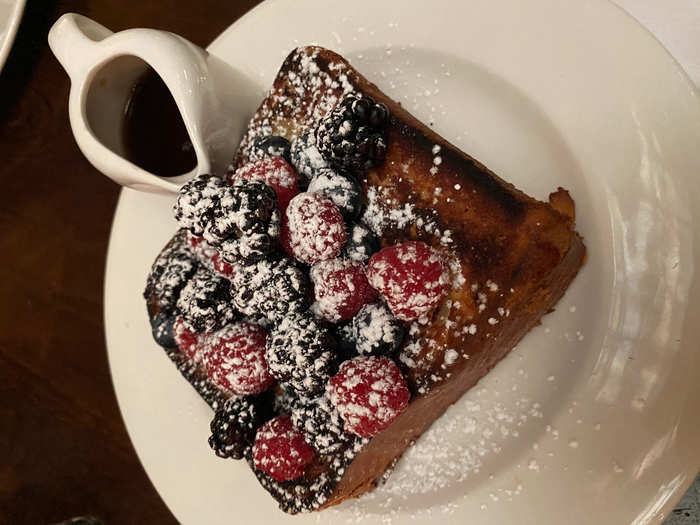
At one point, a camper noticed RZA walk into the hotel with a bodyguard in tow.
"I guess that was the experience," joked Wesley, a camper from just north of Atlanta.
Once plates were cleared, we all piled into two camp shuttles, one driven by entertainer Rawb Lane, who gave us a much-needed dose of 90's hip-hop nostalgia to prep for our arrival to Staten Island. I sat next to now freelance writer Marjua Estevez, who was formerly senior editor at VIBE Magazine and interviewed Cardi B for her first magazine cover for VIBE Viva in 2016. After 20 minutes, the shuttle came to a stop at the Whitehall Ferry Terminal, just in time for the 8:30 a.m. commute.
"I've only ever seen these places in movies or TV shows. It's surreal because I never travel, so this is a crazy experience," said Wesley, peering through a lower-deck window on the Staten Island ferry. "[TAZO is] keeping it a mystery, but I know RZA has a lot of wisdom to impart on us," Valentín said. "He's multifaceted, he's a true artist, and doesn't just stay in his lane with one thing."
Once at Snug Harbor, the group met at the New York Chinese Scholar's Garden, circling before RZA appeared. "Peace," he said, shaking hands with each camper before we entered the garden's temple for a brief tea ceremony.
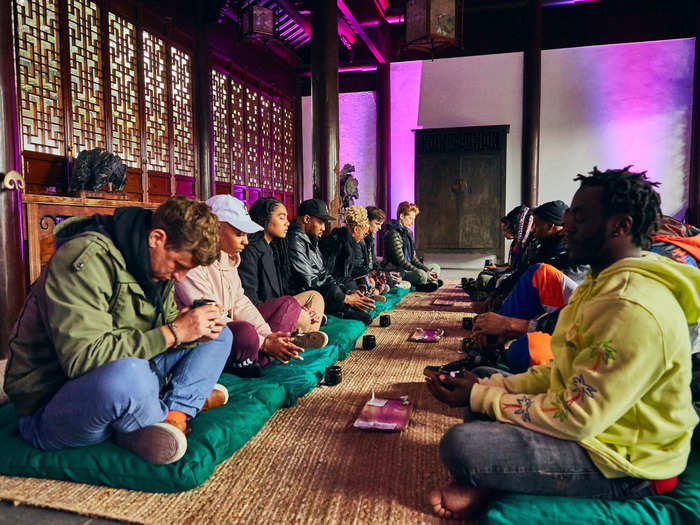
RZA asked that we gather on the temple floor, setting one-word intentions. A multitude of words filled the room, but RZA added two on a whim: "rekindle" and "exchange." His longtime friend and shifu (kung-fu master) Shi Yan Ming joined us after the introductory ceremony, instructing campers through a brief stretching exercise. One camper, Peter Lange, even removed his shoes to thoroughly participate in the session. Through physical endurance and deep breathing exercises, it was clear that the Camp TAZO: Zen wasn't just a meet and greet with RZA, but a probing of mindfulness.
Sessions began in another building on the Snug Harbor grounds, with colorful 'zen' decor, complete with printed cushions, neon wall art, and a TAZO snack station. Senior editor of The Fader, Lawrence Burney, even surprised campers as a moderator.
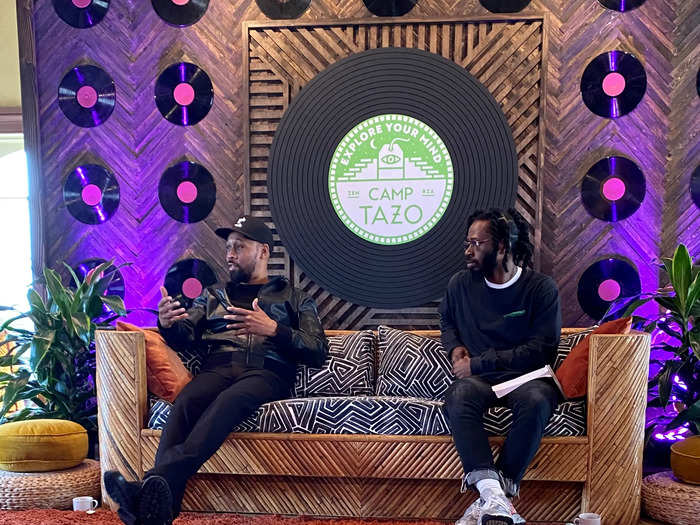
The setting emphasized the camp's purpose of awareness, as RZA spoke about the purpose of Camp TAZO: Zen.
"There's five stages of consciousness, and creativity actually comes from two of those stages; [subconsciousness] and magnetic consciousness," said RZA. "We created [five explorations] to unlock potential and rekindle. Too many times you'll walk away from something [when it's] unfinished. These explorations are here to guide us."
Los Angeles-based camper Nneka Gigi passed around her grandmother's burial pan, Nigerian naira, a handmade doll, and spoke about Afrocentric hair.
"I started to very finely weave my heritage and culture into what I do with my art. People may create art for other people to enjoy, but for me, it started out as a reflective process to try to understand myself," she said. "Where I grew up, I was African before it was popular. Now that we have had this awakening where [being African] is not an embarrassing thing, to be from the diaspora."
Another camper, Emmanuel, reflected on the nuances of an artistic and office-work balance. "Being in a [work] environment where it's formulaic, it can get to you mentally and physically. Cutting ties from that spot and relinquishing the idea of being a 'perfect' person, it almost seems unattainable," he said. "[Being an artist] is a complete let-go of that."
The session lasted until our lunch break, where I briefly spoke with Burney about his recent story on rapper Fetty Wap. After an hour, campers regrouped for our next session.
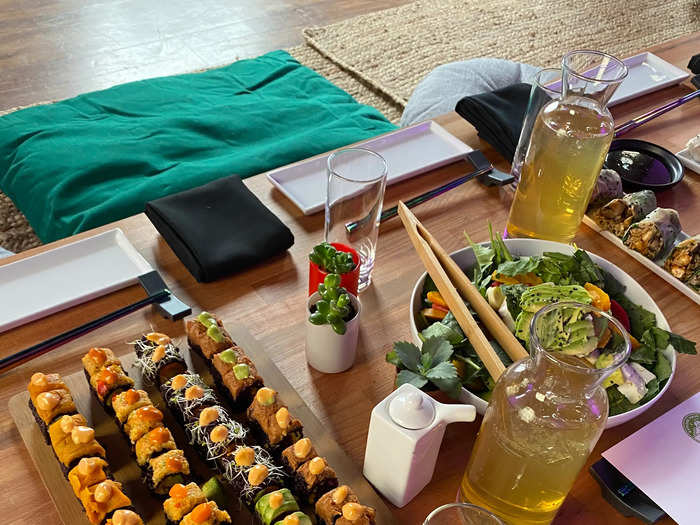
"The reason I'm itemizing [our explorations] is because distractions will happen in the process of each of those things," RZA said, beginning the new session. "With kung fu, your internal noise can beat the external noise. With experiential art — that's gonna be the quietest moment of all — but you're gonna generate sound from that, as well. When it comes to chess, most of my games I'll lose when it's noisy."
I, along with campers Corbin, Tishmone, and Bramucci, joined Adisa Banjoko, a jiu-jitsu trainer and founder of Hip-Hop Chess Federation, for an hour-long "Wu-chess" training, which translated into life lessons.
"[Chess Federation] infuses music, chess, and martial arts to promote unity, strategy, and nonviolence. I'm not a chess master, but at a very young age I was able to start pulling off philosophy concepts from games," Banjoko said, and mentioned being one of the first west coast writers for hip-hop culture magazine, The Source.
"[A lot] of rappers are chess players, but they don't play for the same reasons that a lot of kids from the suburbs play — they want to know how to not die [or] get tricked on their own street [and] see traps coming to avoid them," Banjoko said. "It makes sense why someone like RZA would be attracted to a game like this — all of the Wu [Tang] were, because they were in dangerous situations [and were] trying to figure stuff out."
While "Wu-chess" was challenging, it heavily relied on collaboration, as our group aided each other through our amateur chess process. Perhaps that was the purpose of the first day; collaboration and attempting to harness creativity through various methods.
On the third and final day, we were given an hour to sleep in, rejoining at The Roxy Bar for breakfast and sharing memories of the previous day. As I indulged on a berry-covered waffle and house potatoes, Emmanuel shared his thoughts on RZA's dinner visit.

Once breakfast concluded, we packed our belongings into shuttles transporting us to an industrial-designed coworking space, Pioneer Works, in Red Hook, Brooklyn. We were encouraged to listen to RZA's new TAZO-collaborative spoken-word album, "Guided Explorations," while walking outside, perhaps waiting for RZA's arrival. The album featured RZA calmly recalling his personal experiences as an artist, while also giving the listener affirmations through movement and meditation.
Once we had returned from walking, a lunch of vegetarian sandwiches was catered from Court Street Grocers, and a representative from the marketing company Edelman invited me to meet briefly with RZA. In a glass-divided room within the Pioneer Works coworking space, I sat with RZA and asked about the foundation of Camp TAZO: Zen.
"Zen is a daily routine in the sense of at any given moment — you should pause, think, breathe, reflect, and contemplate on life, before going on with your day. For me, I could be hitting my phone, doing everything I'm doing, but then I'll stop, put it down, look around and absorb," he said about the impact of zen and partnering with TAZO, drawing from his 2009 book, "The Tao of Wu." "We pulled from things that [were] already familiar in my psyche, and by using those as a foundation, we were able to customize the five explorations."
I was familiar with "The Tao of Wu," and had even covered its 15th anniversary in a piece for America Magazine. While RZA didn't wholly focus on street philosophy, his personal disciplines were evident throughout Camp TAZO — from campers solely eating catered vegan meals to finding consciousness through tea steeping and meditative habits.
I asked RZA about the first day of the camp and if it lived up to his initial words, "rekindle" and "exchange."
"For me, the 'rekindle' part was more of a quest into the campers, my idea was to rekindle energy — to rekindle anyone's flame who felt like it was going out, or anyone who felt a little stagnant," he said. "We all exchanged our creativity, and not only to exchange our art with each other, we exchanged some of our spirit, some of our energy, and some of our inhibitions, as well."
Once lunch concluded, campers prepared for goodbyes and RZA asked that we revisit our one-word intentions and how it came full circle during our walk. Campers spoke extensively on their experiences, closely studying RZA's lessons during those two days.
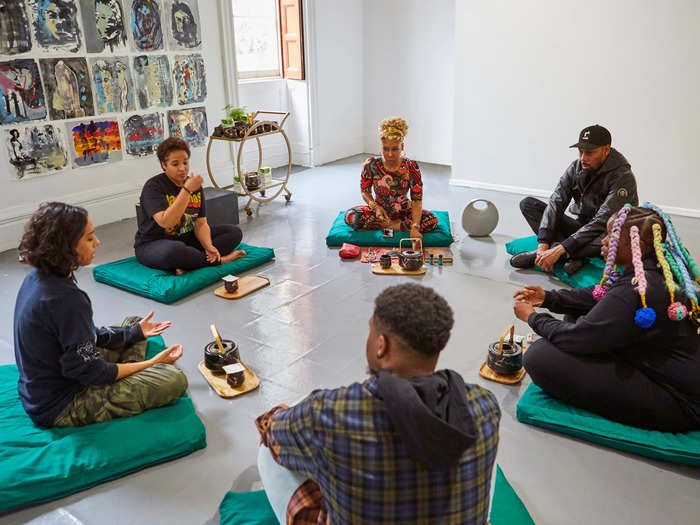
"I feel [that] transitions and shifts are happening [with us] now. When I was on my walk, I was observing the space in general, and instead of looking at the top of the trees, I was visually [thinking of] the roots and [downward]. Doing that helped me see that we're all connected," said camper Peter Lange. All of the campers were in agreement, sharing that they'd hope to continue a yearly retreat outside of Camp TAZO.
"I'm forever changed because I really am," said camper Julian, who later photographed RZA. "I feel like everyone wants to collaborate and no one wants to do the work, but everyone here has left [an] impact on me [within] 24 hours, and that's crazy to say."
"Yesterday, it was okay to be vulnerable, [we] were touched by everyone's artistic ability. What I got from walking to the water and listening to [Guided Explorations] — the rocks are there, but the water was high, which means shit was heavy. We all [have] weight on us, but the water was not out of bounds, it's still in control," said camper Tishmone.
Fellow camper Marjua Estevez, who was moved to tears from the experience, shared that she previously didn't want to attend Camp TAZO, as the trip was held shortly after she moved to Miami, leaving her feeling displaced. "The last place I wanted to be was here, I didn't want to be with strangers, I didn't want to share anything about myself, I wanted to shrink myself and be invisible," she said. "Knowing what I know now, I would've regretted not coming here. Hearing everyone's stories gave me permission to reclaim parts of myself that I had lost."
It seemed that our intentions from the first day had been fulfilled, prompting an emotional finale of Camp TAZO: Zen. RZA explained that the program wasn't just for advertisement purposes, but connecting participants to fulfill their own artistic vision, just as he did with Wu-Tang Clan. "My potential is bringing people together, and when they come together, it's up to them to exchange, stay together, and create something great," he said.
After we left for our respective states, despite only attending the retreat for two days, our group chat still remains active. Whether seeking wisdom from RZA or wanting an opportunity to travel, each camper reconnected with their creative abilities and a new alliance.
For RZA, the group's connection was simple: "I looked at everybody [and thought] that maybe there was something I could add on to. I saw a spark in every one of y'all [and] understood where you guys were in your creative process," he said. "All these different personalities are within this group of people. I chose everybody for a specific reason, and I feel really confident in that."
Popular Right Now
Advertisement